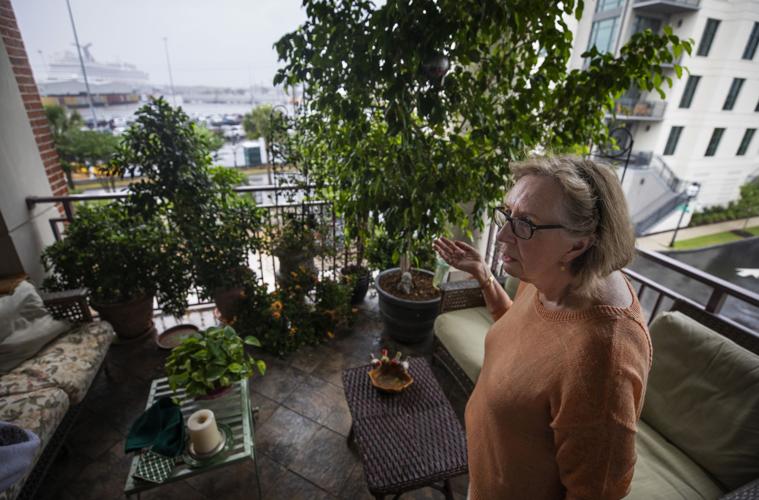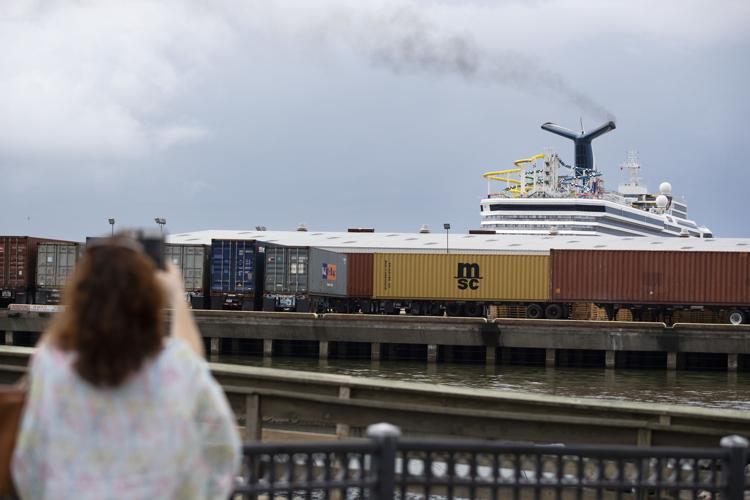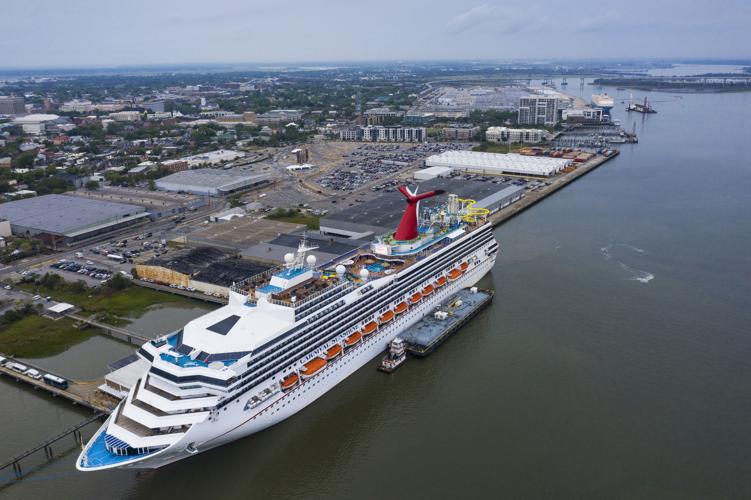Screeching car alarms before sunrise. Snarled traffic on Laurens and Concord streets. Blaring Caribbean music piercing Charleston's quiet.
These sights and sounds are now commonplace in downtown's historic Ansonborough neighborhood.
While travelers gleefully embark on a towering cruise ship for far-off ports, residents such as Tommie Robertson are fighting the State Ports Authority's plan to replace the current cruise ship terminal with a new one only about 500 feet from her porch.
Robertson and her family avoid sitting on the flower- and tree-filled porch of their Laurens Street home when ships are docked.
One day, she was sitting outside with her mother and husband as a cruise ship cleared its engines and a blast of black smoke rolled overhead.
"The minute I breathed in, it’s like I had an instant sore throat," she said. "The new plans will bring them much closer, which intensifies the effect of the emissions, and that’s very worrisome."

Tommie Robertson talks about the impact of the Carnival cruise ship Sunshine from her patio at Anson House Condominiums on Thursday, June 6, 2019. Lauren Petracca/Staff
Robertson and some of her neighbors believe the state Department of Health and Environmental Control erred when issuing a permit for the terminal's development, and some of them sued.
On Tuesday, their case will be heard before the state Supreme Court. For the past six years, the case has wound its way through the system, and the Ports Authority's new terminal essentially has remained on hold.
In 2013, a state administrative law judge ruled that the plaintiffs — a group of city residents and advocacy groups — didn't have an argument and threw out the suit. An appellate court judge upheld the ruling.
About 50 people from Charleston, many traveling in a chartered bus, are expected to attend the Supreme Court hearing. Local advocacy groups — the Preservation Society of Charleston, Historic Charleston Foundation, Historic Ansonborough Neighborhood Association, the Coastal Conservation League, Charleston Communities for Cruise Control and the Charleston chapter of the Surfrider Foundation — have been alerting their supporters.
The SPA built its current cruise ship terminal in the 1970s, and most cruise ships for decades only tied up there briefly.
In 2010, Carnival began basing a cruise ship in Charleston, drawing the attention of neighbors and posing new logistical challenges as more than a thousand passengers embarked and disembarked at a time. In 2012, the SPA sought state and federal permits to build a new $35 million, 100,000-square-foot cruise ship terminal on the same Union Pier property, but closer to Laurens Street.
SPA leadership has had a voluntary agreement with the city that no more than 104 ships will dock a year, only one at a time and must cap at 3,500 passengers — an agreement it has abided by to date. Neighbors and their lawyers, however, note that voluntary agreement isn’t enforceable.
Residents and nonprofits are bringing their case to the Supreme Court as they attempt to fight against the State Port Authority's plans to develop a new cruise ship terminal.
Meanwhile, the SPA also sought a federal permit for the terminal from the Army Corps of Engineers, which approved it. No notice or public hearing to abutting or nearby property owners was required.
But some neighbors also challenged that permit, and a federal court has ordered the process to start over. The Corps of Engineers must consult with a number of agencies, including the National Park Service, before issuing another permit.
DHEC issued a state permit for the project, and if neighbors prevail before the Supreme Court, the legal case involving that permit will return to the administrative law court for trial.
Port Authority and cruise supporters have talked about the positive impacts cruise ships bring to the city and its businesses and have said locking cruise ship limits into law would send a bad signal to the larger maritime industry. Their spokeswoman didn't return an email Monday seeking comment.
Carrie Agnew, who started the Charleston Communities for Cruise Control about eight years ago, said she lived on Hazel Street for almost 15 years before moving out of the neighborhood.
"I would have the announcements at 6:10 in the morning, the music all afternoon," Agnew said of docked ships.
Working from her home office one day, she had difficulty maintaining a conference call, moving farther in her house to combat the music bellowing from the cruise ship. Though her windows were painted shut in her bedroom, she found a slime substance on the fan above her bed, which she attributed to the exhaust fumes from the ships.

The Carnival Sunshine is docked at the cruise terminal in Charleston on Thursday, June 6, 2019. Lauren Petracca/Staff
Her group includes over 300 people spanning five countries who either call Charleston home, have visited the city, or don't want to see the same development and impacts others have seen in Venice and Key West, Fla. Some have displayed protest flags from their downtown homes.
Thompson, with the Historic Ansonborugh Neighborhood Association, said the neighborhood is directly and adversely impacted and will continue to be if the port changes locations.
Charleston Mayor John Tecklenburg will not attend the hearing Tuesday but is hoping the residents ultimately prevail, city spokesman Jack O'Toole said Monday, adding, "The mayor believes our residents should have standing in this case, and hopes the court will grant their request."
Kristopher King, executive director of the Preservation Society of Charleston, said the case is about a neighborhood and community's right to challenge industries that negatively impact their quality of life.
"We continue to be really perplexed and struggling with the notion that if an individual is harmed you have legal standing but if an entire community or an entire neighborhood is harmed, you do not," King said. "The tangible impacts on traffic and congestion are significant. ... So it’s pollution, it’s congestion and honestly it’s about the ability to ensure that businesses operating in a community aren’t adversely impacting families and neighborhoods.”










